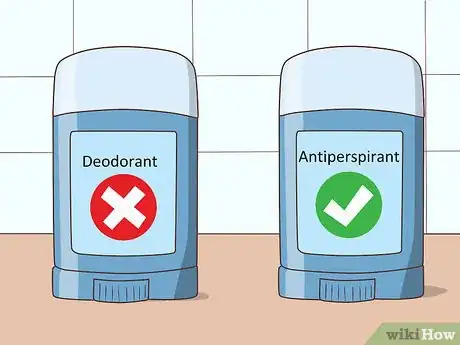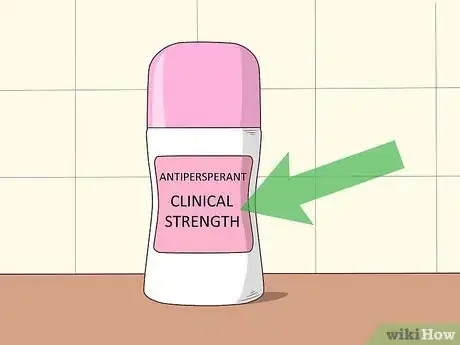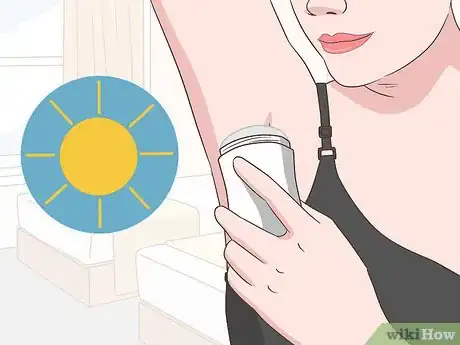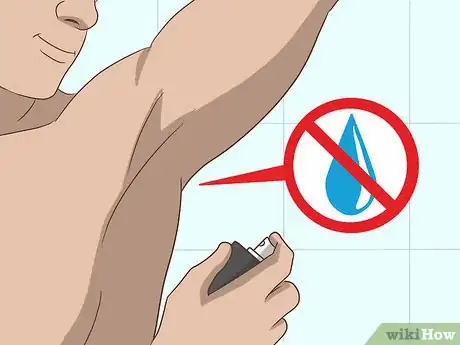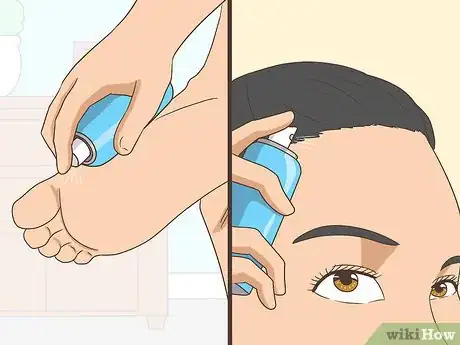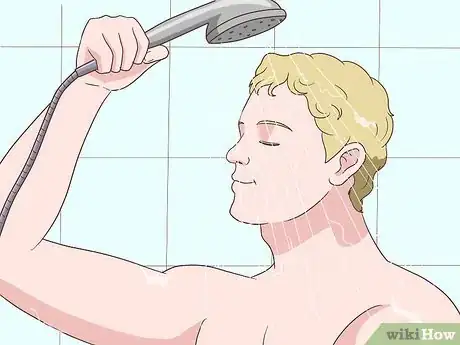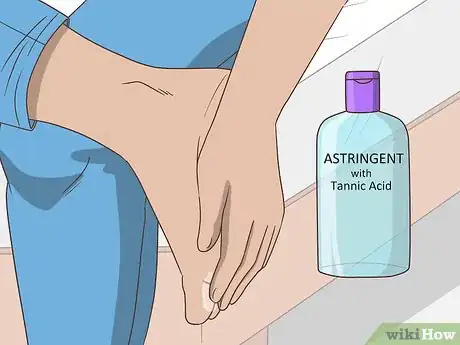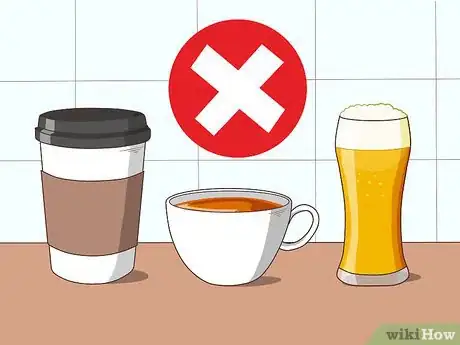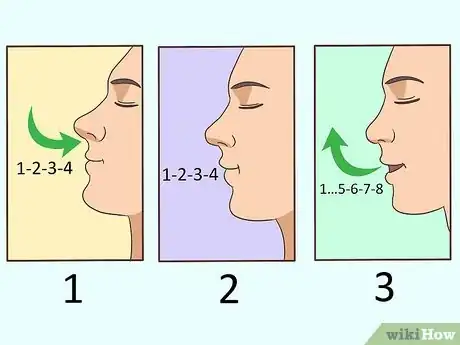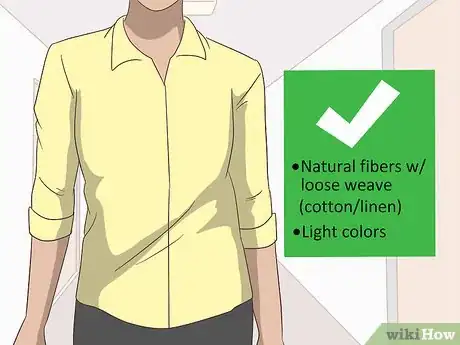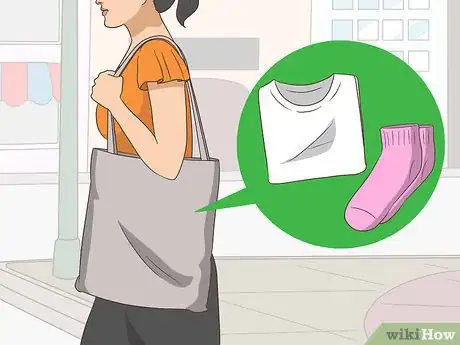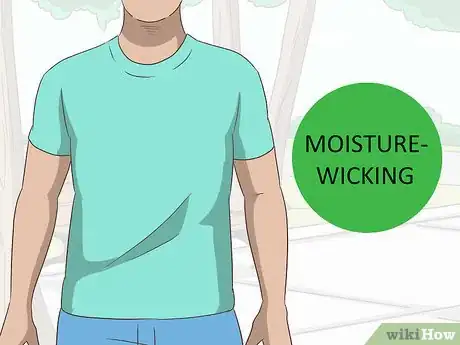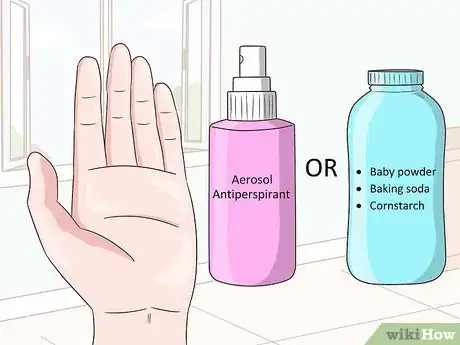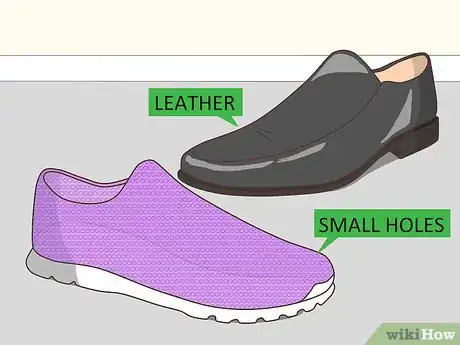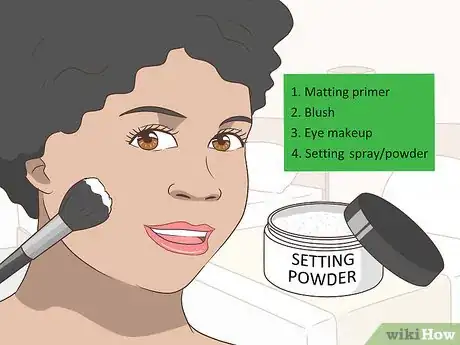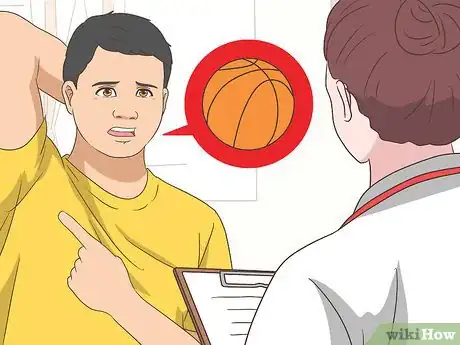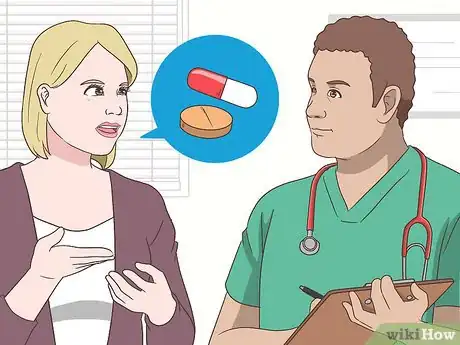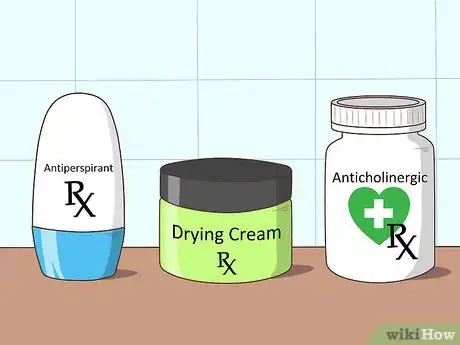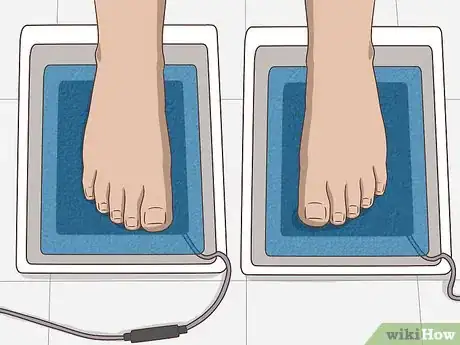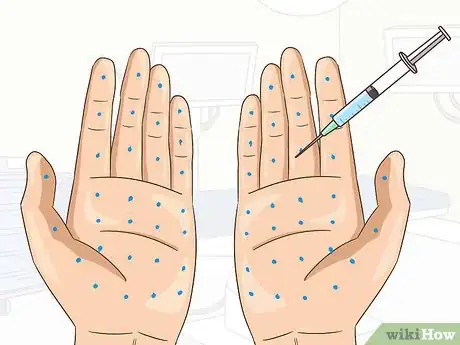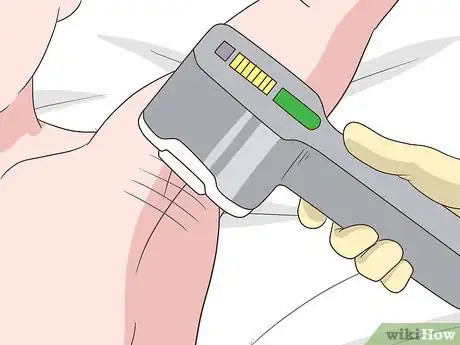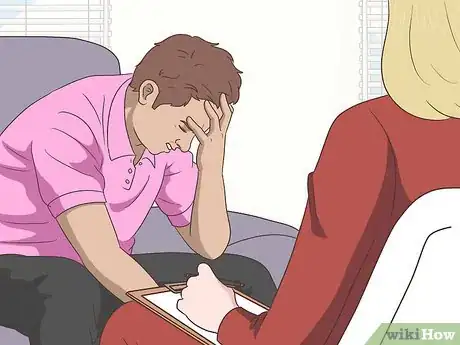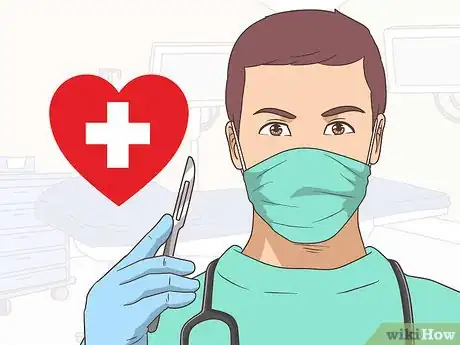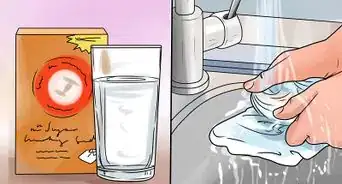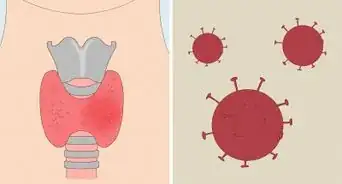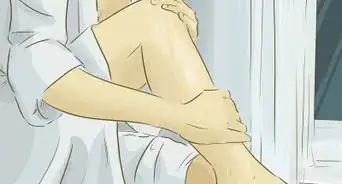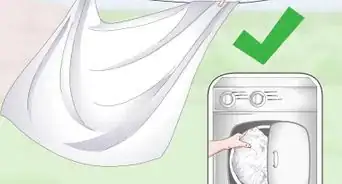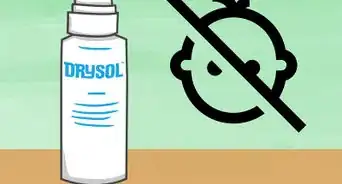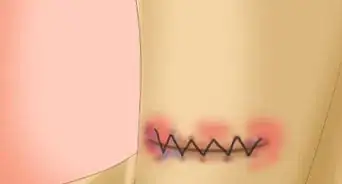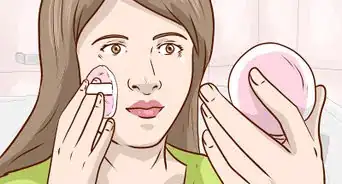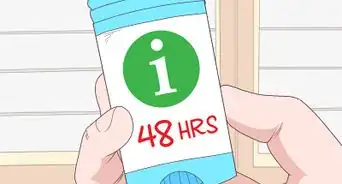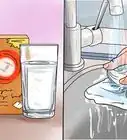This article was medically reviewed by Luba Lee, FNP-BC, MS. Luba Lee, FNP-BC is a Board-Certified Family Nurse Practitioner (FNP) and educator in Tennessee with over a decade of clinical experience. Luba has certifications in Pediatric Advanced Life Support (PALS), Emergency Medicine, Advanced Cardiac Life Support (ACLS), Team Building, and Critical Care Nursing. She received her Master of Science in Nursing (MSN) from the University of Tennessee in 2006.
There are 21 references cited in this article, which can be found at the bottom of the page.
This article has been viewed 2,378,397 times.
Do you avoid shaking hands because your palms are always clammy? Are your socks and shoes constantly soggy and smelly? Are you embarrassed by ever-expanding sweat stains on your clothes? If you have these problems, you're not alone. Fortunately, there are plenty of ways to keep excessive sweating from interfering with your life and clobbering your self-confidence.
Steps
Using an Antiperspirant
-
1Go with an antiperspirant instead of a deodorant. Check labels when you shop for products and be sure to purchase an antiperspirant instead of just a deodorant. Deodorant masks body odor, but it doesn’t do anything to prevent excessive sweating.[1]
- Go with a soft-solid, roll-on product for your underarms. For your hands, feet, legs and other areas of your body choose an aerosol antiperspirant.
-
2Look for a formula labeled "clinical strength." Clinical strength antiperspirants are more expensive, but they’re more effective at preventing perspiration. Most antiperspirant deodorant brands offer a clinical strength formula. You can find them at your local pharmacy and wherever hygiene products are sold.[2]
- Antiperspirants that contain aluminum chloride are the most effective products.[3]
Advertisement -
3Apply antiperspirant in the morning. Applying antiperspirant once a day will offer the best results. Glide the antiperspirant over your skin and evenly coat your underarms with a thin layer. After applying it, gently massage it into your skin to increase its effectiveness.[4]
- Don't apply antiperspirant too much. Sometimes, your body needs to sweat. Avoid using antiperspirant before bed.
-
4Make sure your skin is dry before using an antiperspirant. If you've just gotten out of the shower or if your underarms are sweaty, dry them off with a towel. You could also blow-dry your underarms with a hair dryer set to cool.[5]
- Applying an antiperspirant to wet skin can cause irritation.
-
5Use aerosol antiperspirants on areas other than your underarms. For sweaty feet, spray your soles and between your toes to prevent soggy, sweat-soaked socks. If your face and head sweat a lot, you could spray an aerosol antiperspirant along your hairline.[6]
- There are also antiperspirant wipes available, which you might find more convenient to use than an aerosol.
- Test an antiperspirant before using it on your hairline or any other area of sensitive skin. Apply it to a small patch of skin and make sure you don’t experience any redness or stinging. If you do, avoid using the product on sensitive areas.
Trying Home Remedies
-
1Bathe daily and develop healthy hygiene habits. Bathing daily can keep the bacteria that live on your skin in check. These bacteria cause body odor related to excessive sweating, so reducing their number can help you avoid smelling sweaty.[7]
- Washing with soap after a workout or other rigorous activities is especially important. Washing away sweat and bacteria after exercising can also help control acne.[8]
- While bathing daily is good, try to keep showers short. Long, hot showers can dry out your skin and cause acne or irritation.
-
2Apply products that contain tannic acid to the affected areas. You can find astringent skin care products that contain tannic acid at pharmacies and wherever hygiene products are sold. Apply a thin layer to the areas of your body that sweat excessively, such as your underarms or feet. Read your product's instructions, and use it as directed.[9]
- You could also try brewing strong black tea, which contains tannic acid. Soak a washcloth in the tea or apply the tea bags directly to your skin.
- Clinical strength antiperspirants can cause irritation or worsen eczema and atopic dermatitis, but tannic acid can help minimize these effects.[10]
-
3Skip spicy foods. Chili peppers, hot sauce, and other spicy items can cause sweating, so try to avoid them. If you notice that you start sweating when you eat spicy food, steer clear of them, especially when you’re out and about.[11]
- Additionally, onions and garlic can make your sweat smell unpleasant.
-
4Cut down on caffeinated and alcoholic beverages. Take note if you tend to sweat more when you drink caffeinated coffee or tea, or when you drink alcohol. If necessary, avoid these substances, especially when you’re out in public.[12]
- Keep in mind caffeine is also found in chocolate, so you might need to cut back on sweet treats, too.
-
5Try relaxation techniques if stress causes you to sweat. When you feel overwhelmed or stressed out, breathe in deeply as you count to 4, hold for a 4 count, then exhale slowly for an 8 count. As you control your breathing, imagine you're in a comfortable setting, like a soothing place from your childhood.[13]
- Try doing relaxation techniques before and during stressful situations, like public speaking or going to the dentist.
-
6Keep track of what triggers your sweating. Try keeping a sweat journal to track what causes you to sweat. You could keep a small pad on hand or keep a log on your phone.[14]
- For instance, if you added hot sauce to your lunch and started sweating excessively, make a note. Write down if you start sweating after drinking a glass of wine, or if talking to your crush sends your sweat glands into overdrive.
- Tracking specific triggers will help you know what to avoid in order to prevent excessive sweating.
- Try to shave your whole body whenever you can.
Handling Sweaty Social Situations
-
1Wear light fabrics that allow air circulation. Choose clothes made of natural fibers with a loose weave, such as cotton or linen. Light colors can also help keep you cooler since they don’t absorb as much light and heat as dark colors.
- Sweat stains show up most visibly on gray clothing, so try to avoid that color.
-
2Pack a change of clothes and extra socks. Bring an extra shirt and a pair of pants or skirt that you can change into if you have sweaty spots on your outfit. Before changing, use a cloth or a handkerchief to wipe away excess sweat. Additionally, bring extra socks if your feet sweat a lot.[15]
- If necessary, swap out sweaty socks for a fresh pair 2 or 3 times a day.
- Pack extra clothes in a backpack or compact travel bag. You could also keep extra clothes in your car or in your office at work.
-
3Invest in moisture-wicking apparel. Moisture-wicking apparel is made of specially designed fabric that absorbs and dispels sweat. Wear moisture-wicking undershirts and underwear to avoid visible sweat stains on your outer clothes.[16]
- Moisture-wicking apparel can be pricey. Cotton undergarments are more affordable and can absorb sweat, but they’re not as effective as specialty performance apparel.
-
4Manage clammy hands with an antiperspirant or absorbent powders. If your hands sweat a lot, try spraying them with an aerosol antiperspirant in the morning and before bedtime. Rubbing them with baby powder, baking soda, or cornstarch as needed could also help keep them dry.[17]
- Remember to dry your hands well with a towel or blow dryer before applying antiperspirant.
- If your hands are often clammy, avoid using thick, oily lotions that contain petroleum jelly.
-
5Purchase breathable shoes for sweaty feet. Leather and other natural materials are good choices for dress shoes. When shopping for sneakers, look for options that have small holes for air circulation.[18]
- Additionally, wear sandals or go barefoot whenever possible so your feet can breathe.
- You could also purchase moisture-wicking athletic socks.
-
6Use a setting spray or powder to prevent running makeup. If your head and face sweat a lot and ruin your makeup, apply a matting primer before foundation, blush, and eye makeup. After applying your makeup, finish with a setting spray or powder to prevent it from running.[19]
Consulting a Doctor
-
1Talk to your doctor if sweating interferes with your daily activities. Schedule an appointment if you avoid social activities or feel that sweating has impacted your emotional well-being. You should also consult your doctor if excessive sweating develops suddenly or inexplicably, is accompanied by weight loss, or mainly happens at night.[22]
- You might have a condition called hyperhidrosis, or overactive sweat glands. Your sweating could also be related to another underlying medical condition.
- Your primary doctor might refer you to a dermatologist, or a skin specialist.
- Sweating along with difficulty breathing, chest pain, or pain in your arms, neck, or jaws could be a medical emergency. Get immediate help if you experience these symptoms.[23]
-
2Discuss any medications you take with your doctor. There are countless prescription medications that can cause sweating as a side effect. Ask your doctor if any medications you regularly take might be causing you to sweat. If necessary, ask if they can suggest an alternative medication with fewer side effects.[24]
-
3Ask your doctor if they recommend a prescription medication. Your doctor might recommend a prescription-strength antiperspirant, a drying cream, or an anticholinergic medication. Take any medication according to your doctor's instructions, and don't stop taking your medication without your doctor's approval.[25]
- Prescription antiperspirants and drying creams are typically the first step in medical treatment. Your doctor might prescribe an oral medication if these aren't effective.
- Oral anticholinergic medications are systemic, which means they cause a drying effect throughout your body. They can suppress your sweat glands, but they can also cause dry mouth and dry eyes.
-
4Try iontophoresis for excessive sweating of the hands and feet. Your doctor can prescribe an at-home electric iontophoresis machine, or perform the treatment at their office. In this procedure, a mild electric current is run through water and is used to shut down your sweat glands.[26]
- A typical regimen consists of several 30-minute sessions per week.
- You’ll feel a tingling sensation during the procedure; tingling could persist for a few hours after treatment. Side effects are rare, but may include skin irritation, dryness, and blistering.[27]
-
5Talk to your doctor about Botox injections. Botox can temporarily paralyze sweat glands for 7 to 19 months per injection. It’s used in cases of severe sweating, and can be injected into the underarms, face, hands, or feet.[28]
- Side effects include pain at the injection site and flu-like symptoms. When injected into the palms, Botox can cause temporary weakness and pain.[29]
-
6Consider undergoing microwave thermolysis. These devices work on the armpits or other sweaty areas that have a layer of protective fat. A device delivers controlled electromagnetic energy, which destroys the sweat glands in the treated area. Doctors usually recommend 2 treatments spaced 3 months apart.
- Destroying sweat glands in the underarms doesn’t affect the body’s ability to control its temperature. Only 2% of your sweat glands are located in your underarm areas.
- You won’t feel any pain or discomfort during the procedure, but you could experience redness, swelling, and tenderness for several days. You might feel numbness or tingling in the treated areas for up to 5 weeks after undergoing microwave thermolysis.
-
7See a counselor if anxiety triggers your sweating. If you're experiencing anxiety-triggered sweating, cognitive behavioral therapy or psychotherapy could help you find relief. A counselor or therapist can recommend relaxation techniques and teach you how to recognize and redirect triggering thought patterns.[30]
- If necessary, they might also recommend medication for an anxiety or panic attack disorder.
-
8Undergo surgery as a last resort. Surgery for excessive sweating is rare and only advised in extreme circumstances when all other treatment options have failed. There are 2 surgical procedures used to treat hyperhidrosis:[31]
- Local underarm surgery is performed under local anesthesia in a dermatologist's office. Your doctor will use liposuction, excision (cutting with scalpel or scraper), or lasers to remove the sweat glands. Recovery usually takes 2 days, although you'll need to limit arm activity for about a week.
- A sympathectomy involves removing the nerve that tells the body to sweat excessively. In a related procedure, called a sympathectomy, the nerve is cut instead of removed. These procedures can relieve excessive underarm or hand sweating, but they can also cause heat intolerance, irregular heartbeat, and compulsory sweating, or increased sweating in other parts of the body.[32]
- If your condition requires surgery, your dermatologist will help you decide which option is right for you.
Expert Q&A
-
QuestionDoes lemon work for sweaty hands as well?
 Luba Lee, FNP-BC, MSLuba Lee, FNP-BC is a Board-Certified Family Nurse Practitioner (FNP) and educator in Tennessee with over a decade of clinical experience. Luba has certifications in Pediatric Advanced Life Support (PALS), Emergency Medicine, Advanced Cardiac Life Support (ACLS), Team Building, and Critical Care Nursing. She received her Master of Science in Nursing (MSN) from the University of Tennessee in 2006.
Luba Lee, FNP-BC, MSLuba Lee, FNP-BC is a Board-Certified Family Nurse Practitioner (FNP) and educator in Tennessee with over a decade of clinical experience. Luba has certifications in Pediatric Advanced Life Support (PALS), Emergency Medicine, Advanced Cardiac Life Support (ACLS), Team Building, and Critical Care Nursing. She received her Master of Science in Nursing (MSN) from the University of Tennessee in 2006.
Board-Certified Family Nurse Practitioner Home remedies using lemon or lemon oil has been effective for some people. As long as you are not allergic to lemon you can try and see if it works for you. Squeeze a juice out of lemon and mix it with 1 teaspoon of baking soda to make a paste-like consistency. Rub it into the palms of your hands and leave it for 5-10 minutes and then rinse off. Repeat once daily and see if it helps.
Home remedies using lemon or lemon oil has been effective for some people. As long as you are not allergic to lemon you can try and see if it works for you. Squeeze a juice out of lemon and mix it with 1 teaspoon of baking soda to make a paste-like consistency. Rub it into the palms of your hands and leave it for 5-10 minutes and then rinse off. Repeat once daily and see if it helps. -
QuestionCould sweating too much be the cause of hair falling out?
 Luba Lee, FNP-BC, MSLuba Lee, FNP-BC is a Board-Certified Family Nurse Practitioner (FNP) and educator in Tennessee with over a decade of clinical experience. Luba has certifications in Pediatric Advanced Life Support (PALS), Emergency Medicine, Advanced Cardiac Life Support (ACLS), Team Building, and Critical Care Nursing. She received her Master of Science in Nursing (MSN) from the University of Tennessee in 2006.
Luba Lee, FNP-BC, MSLuba Lee, FNP-BC is a Board-Certified Family Nurse Practitioner (FNP) and educator in Tennessee with over a decade of clinical experience. Luba has certifications in Pediatric Advanced Life Support (PALS), Emergency Medicine, Advanced Cardiac Life Support (ACLS), Team Building, and Critical Care Nursing. She received her Master of Science in Nursing (MSN) from the University of Tennessee in 2006.
Board-Certified Family Nurse Practitioner In some conditions such as hyperthyroidism hair loss and increased perspiration go together. Consult your general practitioner for getting to the root cause of your symptoms.
In some conditions such as hyperthyroidism hair loss and increased perspiration go together. Consult your general practitioner for getting to the root cause of your symptoms.
Warnings
- Seek medical attention if excessive sweating is accompanied by dizziness, chest or stomach pain, chills, weight loss, or other unusual or serious symptoms.[34]⧼thumbs_response⧽
References
- ↑ https://www.aad.org/public/diseases/dry-sweaty-skin/hyperhidrosis#tips
- ↑ https://www.sweathelp.org/hyperhidrosis-treatments/antiperspirants/tips-for-best-results-otc.html
- ↑ https://www.ncbi.nlm.nih.gov/pmc/articles/PMC4857824/
- ↑ https://www.sweathelp.org/hyperhidrosis-treatments/antiperspirants/tips-for-best-results-otc.html
- ↑ https://www.sweathelp.org/hyperhidrosis-treatments/antiperspirants/tips-for-best-results-otc.html
- ↑ https://www.sweathelp.org/hyperhidrosis-treatments/antiperspirants/not-just-for-underarms.html
- ↑ https://www.mayoclinic.org/diseases-conditions/hyperhidrosis/diagnosis-treatment/drc-20367173
- ↑ https://www.aad.org/public/diseases/acne-and-rosacea/exercise-and-sports/workout-causing-acne
- ↑ https://www.mayoclinic.org/diseases-conditions/hyperhidrosis/diagnosis-treatment/drc-20367173
- ↑ https://www.ncbi.nlm.nih.gov/pubmed/21346405
- ↑ https://www.aad.org/public/diseases/dry-sweaty-skin/hyperhidrosis#tips
- ↑ https://www.aad.org/public/diseases/dry-sweaty-skin/hyperhidrosis#tips
- ↑ https://www.mayoclinic.org/diseases-conditions/hyperhidrosis/diagnosis-treatment/drc-20367173
- ↑ https://www.aad.org/public/diseases/dry-sweaty-skin/hyperhidrosis#tips
- ↑ https://www.aad.org/public/diseases/dry-sweaty-skin/hyperhidrosis#tips
- ↑ http://www.slate.com/articles/sports/sports_nut/2005/09/no_sweat.html
- ↑ https://www.sweathelp.org/where-do-you-sweat/sweaty-hands.html
- ↑ https://www.aad.org/public/diseases/dry-sweaty-skin/hyperhidrosis#tips
- ↑ https://www.self.com/story/how-to-stop-makeup-running-when-sweaty
- ↑ https://www.goodhousekeeping.com/beauty/makeup/tips/a22078/summer-makeup-tips/
- ↑ https://www.sweathelp.org/hyperhidrosis-treatments/antiperspirants/not-just-for-underarms.html
- ↑ https://www.sweathelp.org/where-do-you-sweat/sweat-all-over.html
- ↑ https://medlineplus.gov/ency/article/007259.htm
- ↑ https://www.sweathelp.org/pdf/drugs_2009.pdf
- ↑ http://www.sweathelp.org/en/hyperhidrosis-treatments/medications.html
- ↑ http://www.sweathelp.org/en/hyperhidrosis-treatments/iontophoresis.html
- ↑ https://medlineplus.gov/ency/article/007293.htm
- ↑ https://www.ncbi.nlm.nih.gov/pmc/articles/PMC4857824/
- ↑ https://medlineplus.gov/ency/article/007259.htm
- ↑ https://www.healthdirect.gov.au/excessive-sweating-hyperhidrosis
- ↑ https://www.hopkinsmedicine.org/sweat_disorders/hyperhidrosis/treatments/sympathotomy_surgery.html
- ↑ https://www.hopkinsmedicine.org/sweat_disorders/hyperhidrosis/treatments/sympathotomy_surgery.html
- ↑ http://www.sweathelp.org/en/hyperhidrosis-treatments/antiperspirants/not-linked-to-breast-cancer.html
- ↑ http://www.mayoclinic.org/symptoms/excessive-sweating/basics/when-to-see-doctor/sym-20050780
About This Article
To avoid sweating too much, be sure to use an antiperspirant that can prevent sweating, and not a deodorant that only masks body odor. You can also try making diet changes by avoiding spicy foods and caffeinated or alcoholic beverages, which can increase sweating. However, if it's stressful situations that really make you sweat, take a moment to try a relaxation exercise by breathing in deeply as you count to 4, holding your breath for a count of 4, and then exhaling slowly for an 8 count. For more tips from our Medical co-author, including how to change your diet so you sweat less, read on!
